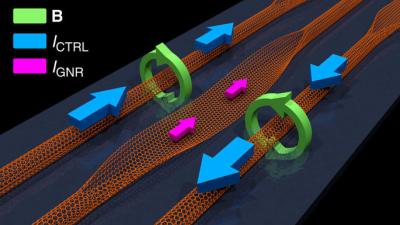Researchers at the University of Central Florida, the University of Texas at Dallas and other collaborators have designed a graphene-based transistor which could be used to create an all-carbon spin logic design with the potential to someday lead to computers that are a thousand times faster and use a hundredth of the power.

The team found that by applying a magnetic field to a graphene ribbon, it is possible to change the resistance of current flowing through it. For this device, the magnetic field is controlled by increasing or decreasing the current through adjacent carbon nanotubes. Increasing or decreasing the strength of the magnetic field would also increase or decrease the flow of current through this new kind of transistor, much like a valve controlling the flow of water through a pipe.